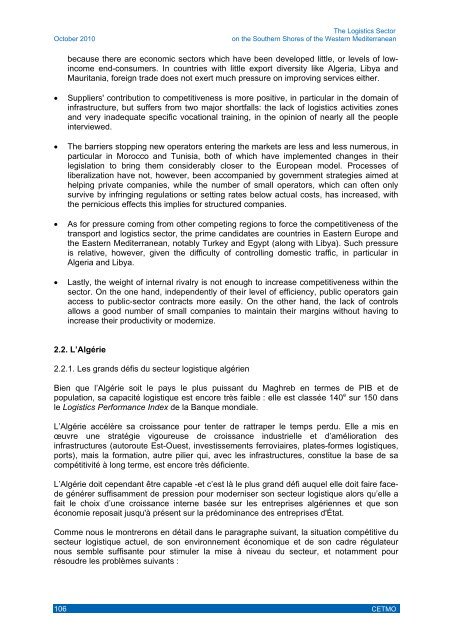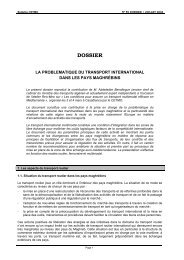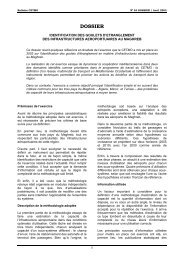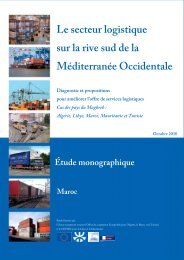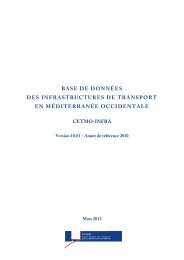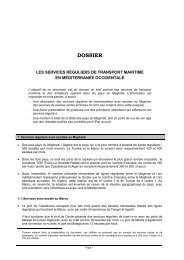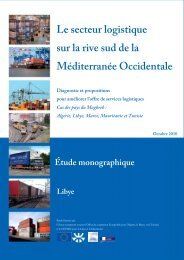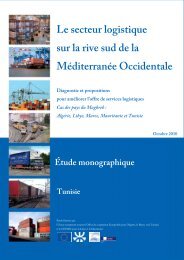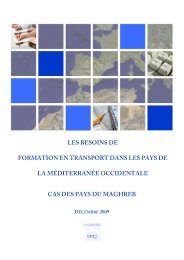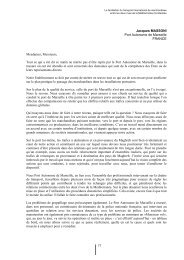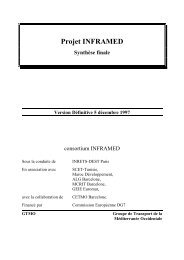The Logistics Sector on the Southern Shores of the Western ... - cetmo
The Logistics Sector on the Southern Shores of the Western ... - cetmo
The Logistics Sector on the Southern Shores of the Western ... - cetmo
- No tags were found...
You also want an ePaper? Increase the reach of your titles
YUMPU automatically turns print PDFs into web optimized ePapers that Google loves.
October 2010<str<strong>on</strong>g>The</str<strong>on</strong>g> <str<strong>on</strong>g>Logistics</str<strong>on</strong>g> <str<strong>on</strong>g>Sector</str<strong>on</strong>g><strong>on</strong> <strong>the</strong> Sou<strong>the</strong>rn <strong>Shores</strong> <strong>of</strong> <strong>the</strong> <strong>Western</strong> Mediterraneanbecause <strong>the</strong>re are ec<strong>on</strong>omic sectors which have been developed little, or levels <strong>of</strong> lowincomeend-c<strong>on</strong>sumers. In countries with little export diversity like Algeria, Libya andMauritania, foreign trade does not exert much pressure <strong>on</strong> improving services ei<strong>the</strong>r.• Suppliers' c<strong>on</strong>tributi<strong>on</strong> to competitiveness is more positive, in particular in <strong>the</strong> domain <strong>of</strong>infrastructure, but suffers from two major shortfalls: <strong>the</strong> lack <strong>of</strong> logistics activities z<strong>on</strong>esand very inadequate specific vocati<strong>on</strong>al training, in <strong>the</strong> opini<strong>on</strong> <strong>of</strong> nearly all <strong>the</strong> peopleinterviewed.• <str<strong>on</strong>g>The</str<strong>on</strong>g> barriers stopping new operators entering <strong>the</strong> markets are less and less numerous, inparticular in Morocco and Tunisia, both <strong>of</strong> which have implemented changes in <strong>the</strong>irlegislati<strong>on</strong> to bring <strong>the</strong>m c<strong>on</strong>siderably closer to <strong>the</strong> European model. Processes <strong>of</strong>liberalizati<strong>on</strong> have not, however, been accompanied by government strategies aimed a<strong>the</strong>lping private companies, while <strong>the</strong> number <strong>of</strong> small operators, which can <strong>of</strong>ten <strong>on</strong>lysurvive by infringing regulati<strong>on</strong>s or setting rates below actual costs, has increased, with<strong>the</strong> pernicious effects this implies for structured companies.• As for pressure coming from o<strong>the</strong>r competing regi<strong>on</strong>s to force <strong>the</strong> competitiveness <strong>of</strong> <strong>the</strong>transport and logistics sector, <strong>the</strong> prime candidates are countries in Eastern Europe and<strong>the</strong> Eastern Mediterranean, notably Turkey and Egypt (al<strong>on</strong>g with Libya). Such pressureis relative, however, given <strong>the</strong> difficulty <strong>of</strong> c<strong>on</strong>trolling domestic traffic, in particular inAlgeria and Libya.• Lastly, <strong>the</strong> weight <strong>of</strong> internal rivalry is not enough to increase competitiveness within <strong>the</strong>sector. On <strong>the</strong> <strong>on</strong>e hand, independently <strong>of</strong> <strong>the</strong>ir level <strong>of</strong> efficiency, public operators gainaccess to public-sector c<strong>on</strong>tracts more easily. On <strong>the</strong> o<strong>the</strong>r hand, <strong>the</strong> lack <strong>of</strong> c<strong>on</strong>trolsallows a good number <strong>of</strong> small companies to maintain <strong>the</strong>ir margins without having toincrease <strong>the</strong>ir productivity or modernize.2.2. L’Algérie2.2.1. Les grands défis du secteur logistique algérienBien que l’Algérie soit le pays le plus puissant du Maghreb en termes de PIB et depopulati<strong>on</strong>, sa capacité logistique est encore très faible : elle est classée 140 e sur 150 dansle <str<strong>on</strong>g>Logistics</str<strong>on</strong>g> Performance Index de la Banque m<strong>on</strong>diale.L’Algérie accélère sa croissance pour tenter de rattraper le temps perdu. Elle a mis enœuvre une stratégie vigoureuse de croissance industrielle et d’améliorati<strong>on</strong> desinfrastructures (autoroute Est-Ouest, investissements ferroviaires, plates-formes logistiques,ports), mais la formati<strong>on</strong>, autre pilier qui, avec les infrastructures, c<strong>on</strong>stitue la base de sacompétitivité à l<strong>on</strong>g terme, est encore très déficiente.L’Algérie doit cependant être capable -et c’est là le plus grand défi auquel elle doit faire facedegénérer suffisamment de pressi<strong>on</strong> pour moderniser s<strong>on</strong> secteur logistique alors qu’elle afait le choix d’une croissance interne basée sur les entreprises algériennes et que s<strong>on</strong>éc<strong>on</strong>omie reposait jusqu'à présent sur la prédominance des entreprises d'État.Comme nous le m<strong>on</strong>trer<strong>on</strong>s en détail dans le paragraphe suivant, la situati<strong>on</strong> compétitive dusecteur logistique actuel, de s<strong>on</strong> envir<strong>on</strong>nement éc<strong>on</strong>omique et de s<strong>on</strong> cadre régulateurnous semble suffisante pour stimuler la mise à niveau du secteur, et notamment pourrésoudre les problèmes suivants :106 CETMO


